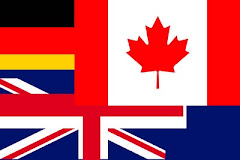In 1792, the Stoeber family left what is now Germany, as part of a group that left Europe under the leadership of William Berczy to come to America. They were to get about 23 acres of land (20 acres of woodland and 3 of pasture) in the land of the Genesee "for six years as tenants bound to deliver half the crop, with the right of preemption, at a 10 percent discount after the expiraton of the agreement. Funds for the passage as well as for supplies were forwarded to them by the [Genesee] Association and were to be repaid during the following six years."
The men worked at cutting the Williamson Road (named for Charles Williamson who built the Benjamin Patterson Inn at Painted Post, New York). The settlers endured many hardships.
Berczy and Williamson did not get along. On 28 July 1793, Williamson, it is reported, made three demands that Berczy would not accept
1. the settlers should accept Williamson as the leader
2. the contracts should be changed
3. the settlers should draw two or three months supply of beef, or pork, and flour.
Reluctantly, Berczy let Williamson speak to the settlers. The settlers refused to accept Williamson as their leader.
"Williamson then threatened to cut off their support. At this, they became angry and started hurling questions at Williamson: where were the promised mills and our church?" Berczy was able to quieten the settlers and Williamson promised them oxen.
29 July 1793 - Day of the Riot
A doctor, who had been hired by Williamson to spread rumours about Berczy, amongst the German settlers, told the settlers that Williamson was willing to forgive all their debts if they left the country. When the settlers asked Williamson about this, he said it was untrue. The doctor took back what he said, but the settlers "gave the doctor a few good blows." Williamson withdrew his offer of oxen, but this angered the settlers so they took oxen out of his barns in Williamsburg.
In August while Berczy and four of the men were in New York, Ontario County officials arrested "the most 'unruly' of the settlers . . . and put them in the Canandaigua jail to await trial. With the aid of the German Society, Berczy was able to get an injunction that "forbade Williamson from further troubling Berczy or his settlers."
The Trial - 30 October 1793
Fifteen of the settlers were tried.
The indictment:
with force and arms to wit with clubs and guns, with an intention to disturb the peace of the said people at the Town of Genesee, unlawfully riotously and routously assembled and met together and being so assembled together in and upon one Charles Williamson, then and there being in the peace of God and the people of the State of New York, made an assault on him the said Charles Williamson and him then and there did evilly treat and other wrongs then and there did to the said Charles Williamson to the great damage of the said Charles Williamson and against the peace of God and the people of the State of New York and their dignity.
The men named as "perpetrators of this 'evil deed' included Johan Nielas Staver" who would be my fourth great grandfather. They were found guilty and given a light fine, which, it is said they were able to pay off by working for the people of Canandaigua.
The "Berczy Settlers" left the area the following spring and headed to Upper Canada after working out a deal with Lord Graves Simcoe.
As far as I know, this was John Stiver's only confrontation with the law.
Information about the above is from the booklet, The Land of the Genesee : retracing the route of the Berczy Settler Ancestors by way of the Williamson Road, 1792-1794, Williamsport, Penn to Markham, Ont., October 23-26, 1996 : Background Booklet prepared by Bob Shank and Lorne Smith.
To learn more about the Markham Berczy Settlers, visit the website





Very interesting, Janet. Your ancestor was not just "another face in the crowd" since he spent at least a night in gaol!
ReplyDeleteYour article reminded me about something in my family's past though my ancestors were just there - not directly involved. It's called the Caraquet Riots and it happened at the end of the 1800s in New Brunswick when the province instituted new "common" schools (secular) which greatly upset my French/Catholic/Acadian ancestors who had fought long and hard for their cultural/religious rights.
ReplyDeleteThis is always a knotty issue, isn't it?
When are people entitled to take up arms against the legally constituted authorities?
Evelyn in Montreal
Great story Janet. Isn't it wonderful when one of our ancestors does something to get mentioned? Whether good or bad, we love it!
ReplyDeleteLorine
Greetings Janet,
ReplyDeleteThanks for sharing your story for this edition of the Canadian Genealogy Carnival. It's information like this about our ancestors that makes them so much more interesting.
Kathryn